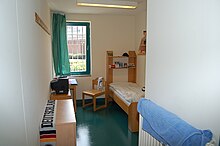Prison cell

A prison cell, also known as a jail cell or lock-up, is a small room in a prison or police station where a prisoner is held. Cells greatly vary for their furnishing, hygienic services, and cleanness both across countries and based on the harshness level of the detention that the prisoner has been convicted to.
Description

In the United States, prison cells are usually about 6 by 8 feet in size[citation needed] with steel or brick walls and one solid or barred door that locks from the outside. Many modern prison cells are pre-cast.[1] Solid doors may have a window that allows the prisoner to be observed from the outside.
Furnishings and fixtures inside the cell are constructed so that they cannot be easily broken and are anchored to the walls or floor. Stainless steel lavatories and commodes are also used. This prevents vandalism or the making of weapons.
There are a number of prison and prison cell configurations, from simple police station holding cells to massive cell blocks in larger correctional facilities. The practice of assigning only one inmate to each cell in a prison is called single-celling.[2]
In many countries, the cells are dirty and have very few facilities.[3] Other countries may house many offenders in prisons, making the cells crowded.[4][5]
Prison cells in the UK
In the United Kingdom, cells in a police station are the responsibility of the Custody Sergeant, who also logs each detainee and allocates him or her an available cell. Custody Sergeants also ensure cells are clean and as germ-free as possible, in accordance with the Human Rights Act of 1998.[6]
Prison cells in the US
In the United States, the standard cell is equipped with either a ledge or a steel bedstead that holds a mattress. A one-piece sink/toilet constructed of welded, putatively stainless steel is also provided. Bars typify older jails, while newer ones have doors that typically feature a small safety glass window and, often, a metal flap that can be opened, e.g., to serve meals.
A limited number of United States prisons offer upgrades. Costing around $100 a night, these cells are considered cleaner and quieter, and some of them offer extra facilities.[7][8][9]
High-security cells
Often, different standard for cells exist in a single country and even in a single jail. Some of those cells are reserved for "isolation", where a convict is kept alone in a cell as punishment method. Some isolation cells contain no furnishing and no services at all.[10]
External links
- Celebrity Justice: Prison Lifestyles of the Rich and Famous, Matt Clarke (Article on pay-to-stay prison facilities) 91111 Now
References
- ^ "5-Sided Precast Prison Cell". OldcastlePrecast.com. Retrieved 1 January 2016.
- ^ Michael Sherman; Gordon J. Hawkins (1983). Imprisonment in America: Choosing the Future. University of Chicago Press. pp. 32–33. ISBN 0-226-75280-1.
- ^ The Daily Mail
- ^ ABC.net.au
- ^ Smh.com.au
- ^ "Human Rights Acts of 1998" (PDF). justice.org.uk. Retrieved 1 January 2016.
- ^ "Upgrade Your Jail Cell For 80 Bucks A Day?". Digitaljournal.com. 2007-04-29. Retrieved 2012-10-26.
- ^ "What Isn't for Sale? - Michael J. Sandel". The Atlantic. 2012-02-27. Retrieved 2012-10-26.
- ^ "Legal articles, cases and court decisions". Prison Legal News. Retrieved 2012-10-26.
- ^ Giunti, Arianna (2014). La cella liscia. Storie di ordinaria repressione nelle carceri Italiane (in Italian). Italy: Inform-ant. ISBN 9788898194193.
